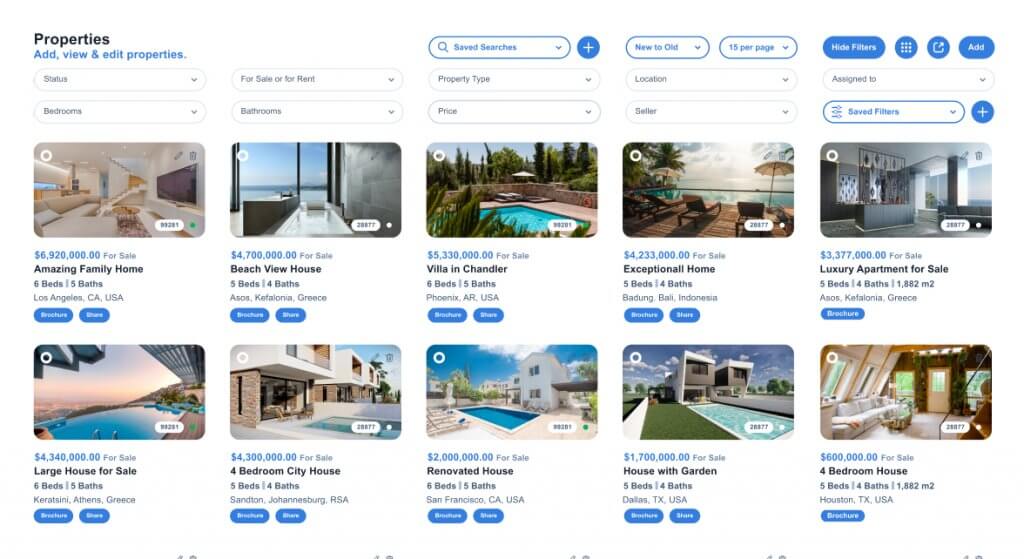Increasing ROI in real estate is crucial for agents looking to succeed in a highly competitive industry. It can be challenging to stand out from the competition, but real estate agents need to make the most of every opportunity to generate leads, build relationships, and close deals. One of the most effective tools for achieving these goals is a real estate CRM. In this blog post, we will explore the financial benefits of a CRM for real estate agents and how it can help maximize their ROI.
The Importance of Increasing ROI in Real Estate
According to a study performed by Nucleus Research, every dollar spent on CRM software brings back an average of $8.71. This is a staggering 771% return on investment (ROI). The reason for this is that a CRM allows agents to manage their leads, automate their marketing, and streamline their workflow. All of which can significantly improve their productivity and bottom line.
A Comprehensive View of Leads with a Real Estate CRM
A CRM can provide a comprehensive view of all the leads an agent has generated, including their source and status in the sales process. As we know, leads are the lifeblood of the real estate industry. By having a clear understanding of where their leads are coming from, agents can identify which marketing campaigns are most effective and adjust their strategies accordingly. For instance, an agent might discover that they are getting the most leads from social media campaigns. This can prompt them to allocate more resources to social media marketing.
Moreover, a CRM allows agents to categorize their leads based on their stage in the sales process, such as new leads, qualified leads, and hot leads. By prioritizing leads in this way, agents can focus on prospects that are most likely to convert into clients. For example, a hot lead who is ready to make a purchase might receive more attention and resources than a new lead who is still in the early stages of the sales process.
Overall, a real estate CRM provides agents with a central location to manage all their leads, track their progress, and optimize their marketing strategies. Agents can make informed decisions by leveraging the insights provided by the CRM, ultimately increasing ROI.
Automating Marketing Tasks for Greater Efficiency
A real estate CRM can automate various marketing tasks, such as sending out drip email campaigns to prospects or clients, scheduling social media posts, and tracking website visits. By automating these tasks, agents can ensure that their marketing efforts are consistent and timely, without having to spend significant time and resources manually sending out emails and creating social media posts.
Furthermore, a CRM can help agents nurture their leads by sending personalized, automated follow-up messages to keep them engaged. For example, an agent might set up an automated email campaign that sends out a series of messages to a prospect over time. Each email could provide helpful tips and information related to the prospect’s interests and needs. This automated nurturing process can help build trust and rapport with prospects. Ultimately increasing the likelihood that they will eventually become clients.
Additionally, a CRM can provide agents with data on the effectiveness of their marketing efforts, such as email open and click-through rates, social media engagement, and website traffic. This information can help agents determine which marketing strategies are most effective and adjust their strategies accordingly.
Overall, by automating marketing tasks with a real estate CRM, agents can save time and increase effectiveness. Ultimately, agents can improve their chances of closing deals successfully.
Streamlining Workflow with a Real Estate CRM
A CRM can help agents streamline their workflow. By centralizing all client information and communication in one place, agents can easily access the information they need. They can track progress on deals, and stay organized. This organization can significantly improve productivity and reduce the risk of errors and missed opportunities.
A CRM can provide a centralized location to store all client information and communication. This can include email threads, meeting notes, and property details. By having all this information in one place, agents can easily access what they need without wasting time searching through various platforms or folders.
Moreover, a CRM can help agents stay organized and on top of their tasks by providing reminders and notifications for important deadlines, meetings, and follow-ups. This feature ensures that agents do not miss any critical details or opportunities. This leads to increased efficiency and better client management.
Additionally, a CRM can help agents manage their workload by automating repetitive tasks, such as sending follow-up emails and reminders. This automation can save agents a considerable amount of time. Instead, agents can focus on other critical tasks such as meeting with clients, preparing property listings, and negotiating deals.
Finally, a CRM can reduce the risk of errors by ensuring that all client information and communication are accurately recorded and up-to-date. This feature can help agents avoid confusion and miscommunication. This ensures improved client satisfaction and higher chances of closing deals successfully.
By streamlining their workflow with a real estate CRM, agents can save time, reduce errors, and improve their productivity. This improved efficiency can lead to better client management, increased profitability, and a higher ROI.
Providing Better Customer Service with a Real Estate CRM
A real estate CRM can help agents provide better customer service to their clients.
A CRM can store all the client information, including their contact details, property preferences, and communication history. With this information, agents can provide personalized and attentive service to their clients. They can answer their questions, and address their concerns promptly.
Moreover, a CRM can help agents stay organized by providing reminders and notifications for important deadlines, meetings, and follow-ups. This feature ensures that agents do not miss any critical details or opportunities, leading to improved client management.
Furthermore, a CRM can help agents build stronger relationships with their clients by enabling them to send personalized messages. This personalized attention can help agents stay top of mind with their clients.
Finally, a CRM can help agents manage client feedback and resolve issues promptly, leading to improved client satisfaction and loyalty. By having all client communication and feedback in one place, agents can quickly address concerns. They can provide solutions, and take action to improve their services.
Overall, a real estate CRM can help agents provide better customer service. This leads to increased satisfaction, loyalty, and referrals. By building strong relationships with their clients, agents can improve their reputation, win more business, and ultimately, increase their ROI.
Investing in a Real Estate CRM for a Higher ROI
A real estate CRM can be a game-changer for agents looking to maximize their ROI. With the ability to manage leads, automate marketing, and streamline workflow, a CRM can significantly improve an agent’s productivity and bottom line. As the real estate industry becomes increasingly competitive, agents who invest in a CRM are likely to see a higher ROI than those who do not.




